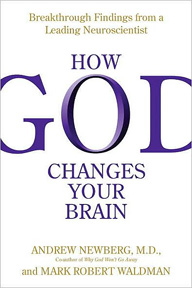
How God Changes Your Brain: Breakthrough Findings from a Leading Neuroscientist
Andrew Newberg M.D. and Mark Robert Waldman


Description
From The Publisher:
God is great–for your mental, physical, and spiritual health. That’s the finding of this startling, authoritative, and controversial book by the bestselling authors of Born to Believe.
Based on new evidence culled from their brain-scan studies on memory patients and meditators, their Web-based survey of people’s religious and spiritual experiences, and their analyses of adult drawings of God, neuroscientist Andrew Newberg, therapist Mark Robert Waldman, and their research team have concluded that active and positive spiritual belief changes the human brain for the better. What’s more, actual faith isn’t always necessary: atheists who meditate on positive imagery can obtain similar neurological benefits. Written in an accessible style–with illustrations highlighting how spiritual experiences affect the mind–How God Changes Your Brain offers the following breakthrough discoveries:
- Not only do prayer and spiritual practice reduce stress and anxiety, but just twelve minutes of meditation per day may slow down the aging process.
- Contemplating a loving God rather than a punitive God reduces anxiety, depression, and stress and increases feelings of security, compassion, and love.
- Fundamentalism, in and of itself, is benign and can be personally beneficial, but the anger and prejudice generated by extreme beliefs can permanently damage your brain.
- Intense prayer and meditation permanently change numerous structures and functions in the brain–altering your values and the way you perceive reality.
How God Changes Your Brain is both a revelatory work of modern science and a practical guide for readers to enhance their physical and emotional health and to avoid mental decline. Newberg and Waldman explain the eight best ways to “exercise” your brain and guide readers through specific routines derived from a wide variety of Eastern and Western spiritual practices that improve personal awareness and empathy. They explain why yawning heightens consciousness and relaxation, and they teach “Compassionate Communication,” a new mediation technique that builds intimacy with family and friends in less than fifteen minutes of practice.
Unique in its conclusions and innovative in its methods, How God Changes Your Brain is a first-of-a-kind book about faith that is as credible as it is inspiring.

Reviews
“Andrew Newberg and Mark Robert Waldman give us a magnificent, comprehensive explanation of how spiritual beliefs and experiences enhance changes in our brains and yield better health and well-being. They bring science and religion closer together.”
—Herbert Benson, M.D., author of The Relaxation Response
“How God Changes Your Brain is a highly practical, easy-to-read guide on the interface between spirituality and neuroscience, filled with useful information that can make your brain and your life better, starting today!”
—Daniel G. Amen, M.D. author of Change Your Brain, Change Your Life
“Not since William James’s The Varieties of Religious Experience has there been a work that so exquisitely integrates science and spirituality. Newberg and Waldman have written a book that is wise, up-to-date, scholarly, mature, and imaginative. At the same time it is a down-to-earth work that will surely inspire repeated readings.”
—George Vaillant, M.D., author of Spiritual Evolution
“How God Changes Your Brain boldly explores the relationship between the structure of our brains and our ability not only to experience but to cultivate innate compassion and deep inner peace.”
—Jill Bolte Taylor, Ph.D., author of My Stroke of Insight
“The authors present an illuminating and encouraging view of the inner and outer workings of our neurological perception of reality and how profoundly it is affected by our spiritual practices. Their practical exercises for a brain tune-up are revolutionary, and I’m enjoying immensely including them in my daily spiritual regime.”
—Michael Bernard Beckwith, author of Spiritual Liberation
“The authors present an elaborate, engaging meditation program to reduce anger and fear and increase serenity and love. They embrace faith (not necessarily religious), diversity, tolerance, and “compassionate communication. . . . A substantial advance in the self-help/spirituality genre and an excellent choice for general collections.”
—Library Journal
“Stimulating and provocative. . . .The authors conclude that meditation and other spiritual practices permanently strengthen neural functioning in specific parts of the brain that aid in lowering anxiety and depression, enhancing social awareness and empathy, and improving cognitive functioning.. . . this forceful study could stir controversy among scientists and philosophers.”
—Publishers Weekly


Reader's Index
Send us your favorite quotes or passages from this book.

About the Authors
Andrew Newberg, M.D., is the director of the Center for Spirituality and the Mind at the University of Pennsylvania. He is one of the founders of the new interdisciplinary field called neurotheology. He is an associate professor in the department of radiology, with secondary appointments in the departments of psychiatry and religious studies, at the University of Pennsylvania. His work has been featured on Good Morning America, Nightline, Discovery Channel, BBC, NPR, and National Geographic Television. He is the co-author of Why God Won’t Go Away, Born to Believe, and The Mystical Mind.
Mark Robert Waldman is an associate fellow at the Center for Spirituality and the Mind at the University of Pennsylvania. He is a therapist, the author or co-author of ten books, including Born to Believe (with Andrew Newberg), and was the founding editor of Transpersonal Review. He lectures throughout the country on neuroscience, religion, and spirituality and conducts research with numerous religious and secular groups. His work has been featured in dozens of newspapers and magazines and on syndicated radio programs.

Table of Contents

Customer Reviews
Write your own online review.

Look for Similar Books by Subject
  |


